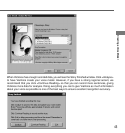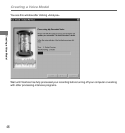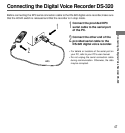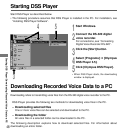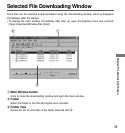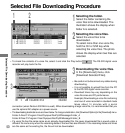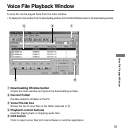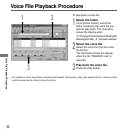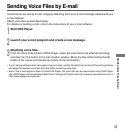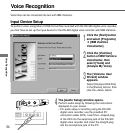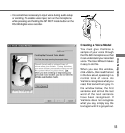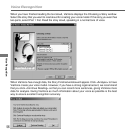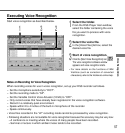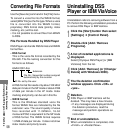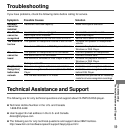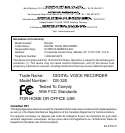
58
Converting File Formats/
Uninstalling DSS Player or IBM ViaVoice
Converting File Formats
Use the [Save As] command in the [File] menu.
To convert a voice file into the WAVE format,
select [WAV File] as the file type. When a voice
file is converted into the WAVE format,
proprietary DSS format data (priority, index
marking, etc.) will be lost.
• It is not possible to convert files from WAVE
to DSS.
File Formats Handled by DSS Player
DSS Player can handle DSS format and WAVE
format files.
• DSS format
This is the voice file format recorded by the
DS-320. The file naming convention for this
format is as follows.
A DSS-format file needs only about 102 kB of
data per minute in the SP mode or about 47kB
of data per minute in the LP mode. Index
marking and priority can be set in this file.
• WAVE format
This is the Windows standard voice file
format. WAVE files are indicated by the file
extension: wav. The sound quality of wave
files recorded with 11.025kHz, 16-bit
monaural PCM, is equivalent to the SP mode
of DSS format. The WAVE format requires
1.3 MB of data per minute. It does not show
index marks and priority levels.
AAAA 0001.dss
Extension
File No.: Sequential number assigned
automatically by the recorder.
ID No. set by the user.
Uninstalling DSS
Player or IBM ViaVoice
Uninstallation refers to removing software from a
PC. Perform the following uninstallation procedure
to remove DSS Player or IBM ViaVoice.
1
Click the [Start] button then select
[Settings] ➔ [Control Panel].
2
Double-click [Add / Remove
Programs].
3
A list of installed applications is
displayed.
Select [Olympus DSS Player] or [IBM
ViaVoice] from the list.
4
Click [Add / Remove] (or [Change/
Delete] with Windows 2000).
5
The file deletion confirmation
window appears. Click <OK> or
<yes>.
6
Deletion.
DSS Player or IBM ViaVoice will be
deleted. This may take a few minutes.
• If any messages are displayed during
the deletion procedure, read the
message and perform operations as
instructed.
7
End of uninstallation.
When uninstallation is completed, click
<Finish> or <Restart Now>.



